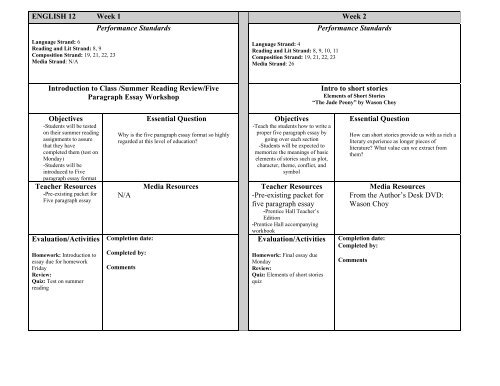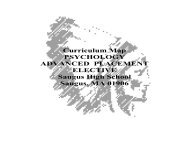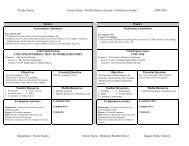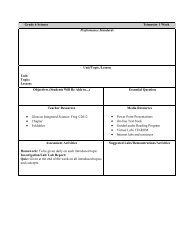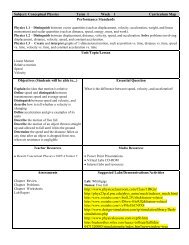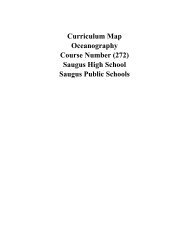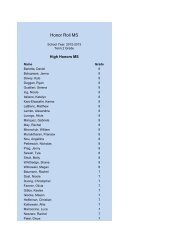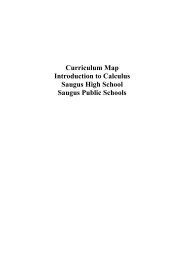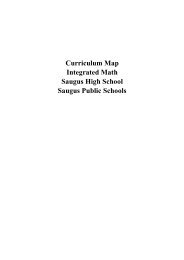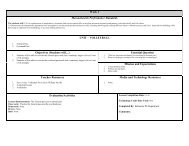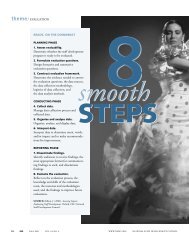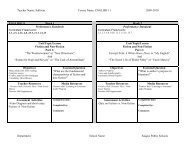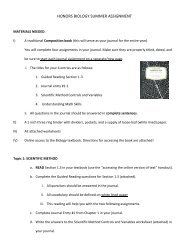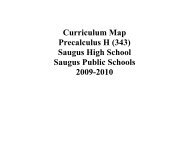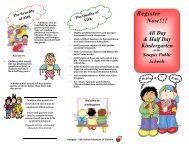English 12 - Saugus Public Schools
English 12 - Saugus Public Schools
English 12 - Saugus Public Schools
You also want an ePaper? Increase the reach of your titles
YUMPU automatically turns print PDFs into web optimized ePapers that Google loves.
ENGLISH <strong>12</strong> Week 1 Week 2<br />
Performance Standards<br />
Performance Standards<br />
Language Strand: 6<br />
Reading and Lit Strand: 8, 9<br />
Composition Strand: 19, 21, 22, 23<br />
Media Strand: N/A<br />
Language Strand: 4<br />
Reading and Lit Strand: 8, 9, 10, 11<br />
Composition Strand: 19, 21, 22, 23<br />
Media Strand: 26<br />
Introduction to Class /Summer Reading Review/Five<br />
Paragraph Essay Workshop<br />
Intro to short stories<br />
Elements of Short Stories<br />
“The Jade Peony” by Wason Choy<br />
Objectives<br />
-Students will be tested<br />
on their summer reading<br />
assignments to assure<br />
that they have<br />
completed them (test on<br />
Monday)<br />
-Students will be<br />
introduced to Five<br />
paragraph essay format<br />
Teacher Resources<br />
-Pre-existing packet for<br />
Five paragraph essay<br />
Evaluation/Activities<br />
Homework: Introduction to<br />
essay due for homework<br />
Friday<br />
Review:<br />
Quiz: Test on summer<br />
reading<br />
Essential Question<br />
Why is the five paragraph essay format so highly<br />
regarded at this level of education?<br />
N/A<br />
Completion date:<br />
Completed by:<br />
Comments<br />
Media Resources<br />
Objectives<br />
-Teach the students how to write a<br />
proper five paragraph essay by<br />
going over each section<br />
-Students will be expected to<br />
memorize the meanings of basic<br />
elements of stories such as plot,<br />
character, theme, conflict, and<br />
symbol<br />
Teacher Resources<br />
-Pre-existing packet for<br />
five paragraph essay<br />
-Prentice Hall Teacher’s<br />
Edition<br />
-Prentice Hall accompanying<br />
workbook<br />
Evaluation/Activities<br />
Homework: Final essay due<br />
Monday<br />
Review:<br />
Quiz: Elements of short stories<br />
quiz<br />
Essential Question<br />
How can short stories provide us with as rich a<br />
literary experience as longer pieces of<br />
literature? What value can we extract from<br />
them?<br />
Media Resources<br />
From the Author’s Desk DVD:<br />
Wason Choy<br />
Completion date:<br />
Completed by:<br />
Comments
Week 3 Week 4<br />
Language Strand: 4<br />
Reading and Lit Strand: 8, 9, 11, <strong>12</strong>, 15<br />
Composition Strand: 20, 23<br />
Media Strand: N/A<br />
Performance Standards<br />
Language Strand: 1, 2, 4<br />
Reading and Lit Strand: 8, 9, 11, <strong>12</strong>, 15<br />
Composition Strand: 19, 20, 23<br />
Media Strand: N/A<br />
Performance Standards<br />
Short Stories<br />
Elements of Short Stories<br />
“American History” by Judith Ortiz Cofer<br />
“The Interlopers” by Saki<br />
Short Stories<br />
“The Man to Send Rain Clouds” by Leslie Marmon Silko<br />
“The Old Man of the Temple” by RK Narayan<br />
Objectives<br />
-Read and understand<br />
both stories<br />
-Students will learn<br />
about surprise endings<br />
and the value they add<br />
to stories<br />
-Students will study and<br />
identify different types<br />
of conflict in stories<br />
Teacher Resources<br />
-Prentice Hall Teacher’s<br />
Edition<br />
-Prentice Hall<br />
accompanying<br />
workbook<br />
Evaluation/Activities<br />
Homework: Creative<br />
Writing: Journal entry about<br />
Elena due Thursday.<br />
Vocabulary definitions due<br />
Friday<br />
Review: Conflict, surprise<br />
ending<br />
Quiz:<br />
Essential Question<br />
What value does a surprise ending, such as the<br />
ending from “The Interlopers”, add to a story?<br />
N/A<br />
Media Resources<br />
Completion date:<br />
both stories read by Friday<br />
Completed by:<br />
Comments<br />
Objectives<br />
-Students will be expected to<br />
understand exactly what role<br />
settings can play in different<br />
stories<br />
-Be able to compare stories and<br />
tell what the differences are in<br />
theme<br />
Teacher Resources<br />
-Prentice Hall Teacher’s<br />
Edition<br />
-Prentice Hall accompanying<br />
workbook<br />
Evaluation/Activities<br />
Homework: Creative Writing:<br />
Journal entry about Elena due<br />
Thursday. Vocabulary definitions<br />
due Friday<br />
Review: Setting in terms of time,<br />
place and culture<br />
Quiz: Vocabulary Quiz on Tues<br />
or Wed<br />
Essential Question<br />
How does a story’s cultural setting<br />
shape its outcome just as much as its<br />
time and place?<br />
N/A<br />
Completion date:<br />
Completed by:<br />
Comments<br />
Media Resources
Week 5 Week 6<br />
Performance Standards<br />
Performance Standards<br />
Language Strand: 4, 5, 6<br />
Reading and Lit Strand: 8, 9, 10, 11<br />
Composition Strand: 22<br />
Media Strand: N/A<br />
Language Strand: 4,5, 6<br />
Reading and Lit Strand: 8, 10, 11, 15<br />
Composition Strand: 19, 20, 21, 22<br />
Media Strand: N/A<br />
Short Stories<br />
“The Golden Kite, the Silver Wind” by Ray Bradbury<br />
“The Most Dangerous Game” by Richard O’Connell<br />
Short Stories<br />
“The Most Dangerous Game” by Richard O’Connell<br />
Review/examination<br />
Objectives<br />
-To understand symbolism<br />
and allegory<br />
-To read and understand both<br />
stories, and review all short<br />
story concepts<br />
-Assign an essay on a<br />
story of students’<br />
choice, due next week<br />
Teacher Resources<br />
-Prentice Hall Teacher’s<br />
Edition<br />
-Prentice Hall<br />
accompanying<br />
workbook<br />
Evaluation/Activities<br />
Homework: Symbol<br />
examples due Tues or Wed<br />
Review: Symbol, allegory<br />
Quiz: Vocabulary Quiz on<br />
Tues or Wed<br />
Essential Question<br />
How can authors use symbols, both obviously and<br />
subtlety, to enrich their stories?<br />
N/A<br />
Media Resources<br />
Completion date:<br />
Both stories to be completed by Friday<br />
Completed by:<br />
Friday<br />
Comments<br />
Objectives<br />
-Students will review and be<br />
tested on all of the concepts and<br />
skills they have learned<br />
throughout the short story unit<br />
-Read and understand “The Most<br />
Dangerous Game”<br />
Teacher Resources<br />
-Prentice Hall Teacher’s<br />
Edition<br />
-Prentice Hall accompanying<br />
workbook<br />
Evaluation/Activities<br />
Homework: N/A<br />
Review: All concepts including<br />
plot, theme, character, conflict,<br />
symbol, allegory, comparing<br />
stories, and deep readings<br />
Quiz: Exam on Short Story<br />
Concepts on Friday, essay due on<br />
Thursday<br />
Essential Question<br />
What educational value have we<br />
extracted from the short stories we<br />
have read?<br />
N/A<br />
Completion date:<br />
Completed by:<br />
Comments<br />
Media Resources
Week 7 Week 8<br />
Language Strand: 2, 4, 6<br />
Reading and Lit Strand: 10, <strong>12</strong>, 15<br />
Composition Strand: 22, 23<br />
Media Strand: N/A<br />
Performance Standards<br />
Language Strand: 2,4<br />
Reading and Lit Strand: 10, 11, <strong>12</strong>, 18<br />
Composition Strand: 19, 20, 21<br />
Media Strand: N/A<br />
Performance Standards<br />
Ordinary People by Judith Guest<br />
Introduction/chapters 1-3<br />
Ordinary People by Judith Guest<br />
Chapters 4-10<br />
Objectives<br />
-Give students a background<br />
of the novel<br />
-Introduce students to the<br />
characters<br />
-Get through chapters 1-3<br />
-Teach the students how<br />
to annotate a text<br />
Teacher Resources<br />
-Ordinary People novel unit,<br />
purchased online<br />
-the novel itself<br />
Essential Question<br />
How do people cope with tragedy in real life? Are<br />
Guest’s characters realistic in this regard?<br />
Media Resources<br />
Objectives<br />
-Illustrate to students the<br />
continually straining<br />
relationship between Calvin<br />
and Beth<br />
-Introduce outside sources about<br />
teenage coping mechanisms<br />
-Study vocabulary<br />
Teacher Resources<br />
-Ordinary People novel unit,<br />
purchased online<br />
-the novel itself<br />
Essential Question<br />
Why is it so difficult for Calvin and Beth to<br />
communicate after coping with such a<br />
tragedy?<br />
N/A<br />
Media Resources<br />
Evaluation/Activities<br />
Homework: Journal about a<br />
hard time in students’ lives,<br />
due Tues/Wed, first<br />
annotations due Friday<br />
Review:<br />
Quiz:<br />
Completion date:<br />
Completed by:<br />
Friday<br />
Comments<br />
Evaluation/Activities<br />
Homework: Reading and<br />
annotations due on Tues/Wed, and<br />
Friday, Dramatic scene performed<br />
on Thursday<br />
Review:<br />
Quiz: N/A<br />
Completion date:<br />
Completed by:<br />
Comments
Week 9 Week 10<br />
Language Strand: 2,4<br />
Reading and Lit Strand: 10, 11, <strong>12</strong>, 18<br />
Composition Strand: 19, 20, 21<br />
Media Strand: N/A<br />
Performance Standards<br />
Language Strand: 2,4<br />
Reading and Lit Strand: 10, 11, <strong>12</strong>, 18<br />
Composition Strand: 19, 20, 21<br />
Media Strand: N/A<br />
Performance Standards<br />
Ordinary People by Judith Guest<br />
Chapters 11-18<br />
Ordinary People by Judith Guest<br />
Chapters 19-25<br />
Objectives<br />
-Discuss thematic<br />
development and complete<br />
worksheet<br />
-Analyze each of the<br />
main characters and<br />
discuss how themes are<br />
shown through them<br />
Teacher Resources<br />
-Ordinary People novel unit,<br />
purchased online<br />
-the novel itself<br />
Essential Question<br />
As a longer novel goes on, how are characters<br />
developed through their actions and what we know<br />
about their thoughts?<br />
N/A<br />
Media Resources<br />
Objectives<br />
-Teach the students how to<br />
pull information out of<br />
isolated passages<br />
-Use MCAS practice prompt and<br />
then swap it with passage from<br />
novel<br />
Teacher Resources<br />
-Ordinary People novel unit,<br />
purchased online<br />
-the novel itself<br />
Essential Question<br />
How can writing skills be honed to write about<br />
specific literary passages?<br />
N/A<br />
Media Resources<br />
Evaluation/Activities<br />
Homework: Study guide<br />
questions due on Thursday<br />
Review:<br />
Quiz: Quiz on chapters 1-10<br />
on Monday<br />
Completion date:<br />
Completed by:<br />
Friday<br />
Comments<br />
Evaluation/Activities<br />
Homework: Five paragraph<br />
essays on passage analysis due on<br />
Friday<br />
Review: Five paragraph essay<br />
skills<br />
Quiz: Vocabulary Quiz on<br />
Monday<br />
Completion date:<br />
Completed by:<br />
Friday<br />
Comments
Week 11 Week <strong>12</strong><br />
Language Strand: 2,4<br />
Reading and Lit Strand: 10, 11, <strong>12</strong>, 18<br />
Composition Strand: 19, 20, 21<br />
Media Strand: N/A<br />
Performance Standards<br />
Language Strand: 1, 2, 3<br />
Reading and Lit Strand: N/A<br />
Composition Strand: 19, 20, 21<br />
Media Strand: 26<br />
Performance Standards<br />
Ordinary People by Judith Guest<br />
Chapters 26-epilogue<br />
Ordinary People by Judith Guest<br />
MOVIE<br />
Objectives<br />
-Complete the novel<br />
-Discuss with the class how<br />
each character ended up<br />
-Work on alternate<br />
endings<br />
Essential Question<br />
How have all of Guest’s characters changed or<br />
evolved throughout the novel? What is Guest<br />
specifically trying to say about each of her themes?<br />
Objectives<br />
-Students will view the film<br />
Ordinary People and make<br />
connections to the novel<br />
Essential Question<br />
In what ways does the film differ from the<br />
novel and how does a film change our<br />
perspective of the story?<br />
Teacher Resources<br />
-Ordinary People novel unit,<br />
purchased online<br />
-the novel itself<br />
N/A<br />
Media Resources<br />
Teacher Resources<br />
-Ordinary People novel unit,<br />
purchased online<br />
-the novel itself<br />
Media Resources<br />
Ordinary People video cassette<br />
Evaluation/Activities<br />
Homework: Alternate<br />
ending stories due on<br />
Thursday<br />
Review: Entire novel:<br />
characters, plot, themes,<br />
motifs<br />
Quiz: Test on the novel on<br />
Friday<br />
Completion date:<br />
Completed by:<br />
Friday<br />
Comments<br />
Evaluation/Activities<br />
Homework: Comparison<br />
worksheet comparing the novel<br />
with the movie due on Thursday<br />
Review:<br />
Quiz:<br />
Completion date:<br />
Completed by:<br />
.<br />
Comments
Week 13 Week 14<br />
Language Strand: 2, 4<br />
Reading and Lit Strand: 10, 14, 15<br />
Composition Strand: N/A<br />
Media Strand: N/A<br />
Performance Standards<br />
Language Strand: 2, 4<br />
Reading and Lit Strand: 10, 14, 15<br />
Composition Strand: N/A<br />
Media Strand: N/A<br />
Performance Standards<br />
Poetry<br />
Elements of Poetry<br />
Types of Poetry<br />
Narrative Poetry: “Casey at the Bat” by Ernest Lawrence Thayer<br />
“Fifteen” by William Stafford<br />
“Twister Hits Houston” by Sandra Cisneros<br />
Poetry<br />
Sound devices/figurative language<br />
“We Never Know How High We Are” by Emily Dickenson<br />
“The Road Not Taken” and “Stopping by the Woods on a Snowy Evening” by<br />
Robert Frost<br />
“Macavity: The Mystery Cat” by TS Eliot<br />
“There is No Word for Goodbye” by Mary Tallmountain<br />
Objectives<br />
-To give students an<br />
overview of the elements of<br />
poetry, including stanzas,<br />
sound devices, and figurative<br />
language<br />
-To introduce students<br />
to some of the types of<br />
poetry, starting with<br />
narrative poems<br />
Teacher Resources<br />
-Prentice Hall Teacher’s<br />
edition<br />
-Prentice Hall<br />
accompanying<br />
workbook<br />
Evaluation/Activities<br />
Homework: Worksheet on<br />
narrative poetry, define terms<br />
Review:<br />
Quiz: Quiz on poetic terms<br />
on Friday<br />
Essential Question<br />
What do narrative poems have in common with other<br />
types of literature?<br />
N/A<br />
Completion date:<br />
Completed by:<br />
Comments<br />
Media Resources<br />
Objectives<br />
-Students will read poetry with an<br />
emphasis on various figurative<br />
language devices and sound<br />
devices such as metaphors,<br />
similes, imagery, alliteration,<br />
assonance, consonance, rhyme,<br />
and rhythm<br />
Teacher Resources<br />
-Prentice Hall Teacher’s edition<br />
-Prentice Hall accompanying<br />
workbook<br />
Evaluation/Activities<br />
Homework: Poems due on<br />
Thursday, study guide questions<br />
due on Friday<br />
Review:<br />
Quiz<br />
Essential Question<br />
Why do many poets choose to use figurative<br />
language rather than stating ideas literally?<br />
What qualities do each of the sound devices<br />
give the poems?<br />
N/A<br />
Completion date:<br />
Completed by:<br />
Comments<br />
Media Resources
Week 15 Week 16<br />
Performance Standards<br />
Performance Standards<br />
Language Strand: 2, 3, 4<br />
Reading and Lit Strand: 10, 14, 15<br />
Composition Strand: 19, 20, 23<br />
Media Strand: N/A<br />
Language Strand: 1, 4, 5, 6<br />
Reading and Lit Strand: <strong>12</strong>, 16, 17, 18<br />
Composition Strand: 24<br />
Media Strand: 26<br />
Poetry<br />
Haiku/Sonnets<br />
“Three Haiku” by Basho and Chiyojo<br />
“Sonnet 30” and “Sonnet 130” by William Shakespeare<br />
“Women” by Alice Walker<br />
“I Hear America Singing” by Walt Whitman<br />
Romeo and Juliet<br />
Introduction to Shakespeare and Act I<br />
Objectives<br />
-Students will learn the<br />
poetry types of haiku and<br />
sonnet<br />
-Students will learn free<br />
verse<br />
Teacher Resources<br />
-Prentice Hall teacher’s<br />
edition and<br />
accompanying<br />
workbook<br />
Evaluation/Activities<br />
Homework: Freestyle poems<br />
due on Thursday<br />
Review:<br />
Quiz: Poetry exam on Friday<br />
Essential Question<br />
How have different cultures used poetry in<br />
different ways? Why is poetry such a mainstay in<br />
literature across all cultures?<br />
Completion date:<br />
Completed by:<br />
Comments<br />
Media Resources<br />
Objectives<br />
-Teach background information<br />
on Elizabethan theater<br />
-Point out the puns<br />
-Get students acclimated with<br />
Shakespeare’s language<br />
-Show inspiration for the story<br />
Teacher Resources<br />
-Prentice Hall teacher’s edition<br />
and accompanying workbook<br />
Evaluation/Activities<br />
Homework: Translation of<br />
Chorus’s prologue due on<br />
Tues/Wed, questions due on<br />
Thursday<br />
Review:<br />
Quiz: N/A<br />
Essential Question<br />
Why is Shakespeare considered to be the most<br />
popular and quoted writer in the <strong>English</strong><br />
language?<br />
Media Resources<br />
Shakespeare’s Life biography cassette tape<br />
Completion date:<br />
Completed by:<br />
Comments
Week 17 Week 18<br />
Performance Standards<br />
Language Strand: 1, 4, 5, 6<br />
Reading and Lit Strand: 10, 11, <strong>12</strong>, 17, 18<br />
Composition Strand: 19, 20, 21, 22<br />
Media Strand: N/A<br />
Language Strand: 1, 4, 5, 6<br />
Reading and Lit Strand: <strong>12</strong>, 17, 18<br />
Composition Strand: N/A<br />
Media Strand:N/A<br />
Performance Standards<br />
Romeo and Juliet<br />
Act II<br />
Romeo and Juliet<br />
Act III<br />
Objectives<br />
-Continue to work with<br />
Shakespeare’s language<br />
-Work on understanding<br />
iambic pentameter<br />
-Perform textual analysis to<br />
assure students understand<br />
the text<br />
Essential Question<br />
What effect does Shakespeare’s language have on the<br />
play? How does the iambic pentameter give the play a<br />
poetic effect?<br />
Objectives<br />
-Teach the students about<br />
Shakespeare’s different types of<br />
speeches, such as soliloquy, aside<br />
and monologue and the difference<br />
between the three.<br />
-Discuss how events can set<br />
stories in motion<br />
Essential Question<br />
How do the deaths of Mercutio and Tybalt add<br />
drama and mood to the play and also seem to<br />
set in motion the events of the rest of the<br />
story?<br />
-What can we learn about a character from<br />
their soliloquies?<br />
Teacher Resources<br />
-Prentice Hall teacher’s<br />
edition and<br />
accompanying<br />
workbook<br />
Evaluation/Activities<br />
Homework: Study guide<br />
questions<br />
Review: Iambic pentameter<br />
Quiz: Act I reading quiz<br />
N/A<br />
Completion date:<br />
Completed by:<br />
Comments<br />
Media Resources<br />
Teacher Resources<br />
-Prentice Hall teacher’s edition<br />
and accompanying workbook<br />
Evaluation/Activities<br />
Homework: Worksheet<br />
identifying soliloquy, aside, and<br />
monologue<br />
Review: Iambic pentameter<br />
Quiz:<br />
N/A<br />
Completion date:<br />
Completed by:<br />
Comments<br />
Media Resources
Week 19 Week 20<br />
Performance Standards<br />
Performance Standards<br />
Language Strand: 1, 4, 5, 6<br />
Reading and Lit Strand: <strong>12</strong>, 15 17, 18<br />
Composition Strand: N/A<br />
Media Strand: N/A<br />
Language Strand: 3, 5, 6<br />
Reading and Lit Strand: <strong>12</strong>, 15, 17, 18<br />
Composition Strand: 19, 20, 21<br />
Media Strand: 27<br />
Romeo and Juliet<br />
Act IV-V<br />
Romeo and Juliet<br />
Act V(Continued)<br />
Conclusion<br />
Objectives<br />
-Teach what comic relief is<br />
through the servants and<br />
musicians at the Capulet<br />
household<br />
-Work on writing effective<br />
summaries<br />
Teacher Resources<br />
-Prentice Hall teacher’s<br />
edition and<br />
accompanying<br />
workbook<br />
Evaluation/Activities<br />
Homework: Friar Lawrence<br />
character analysis paragraphs<br />
Review:<br />
Quiz: Act III reading quiz<br />
Essential Question<br />
Why does Shakespeare use comic relief in his play,<br />
even though it is a tragedy? What effect might comic<br />
relief have had on a viewer in Elizabethan theatre?<br />
N/A<br />
Completion date:<br />
Completed by:<br />
Comments<br />
Media Resources<br />
Objectives<br />
-Talk about alternative endings<br />
-Discuss the ending of the tragedy<br />
and how things could have<br />
possibly been different<br />
-Put together what we have<br />
already learned about tragedy and<br />
take a closer look at how it ends.<br />
Teacher Resources<br />
-Prentice Hall teacher’s edition<br />
and accompanying workbook<br />
Evaluation/Activities<br />
Homework: Alternate endings<br />
writing exercise/Video or oral<br />
presentation on revised scene<br />
Review:<br />
Quiz: Test on the entire play on<br />
Friday<br />
Essential Question<br />
How could the tragedy have been averted?<br />
Who should shoulder the most blame in the<br />
deaths of the characters?<br />
N/A<br />
Completion date:<br />
Completed by:<br />
Comments<br />
Media Resources
Week 21 Week 22<br />
Performance Standards<br />
Performance Standards<br />
Language Strand: 3, 5, 6<br />
Reading and Lit Strand: <strong>12</strong>, 17, 18<br />
Composition Strand: 19, 20, 21, 22, 23, 25<br />
Media Strand: 26<br />
Language Strand: 1, 4, 5, 6<br />
Reading and Lit Strand: 9, 10, <strong>12</strong>, 13, 16<br />
Composition Strand: N/A<br />
Media Strand: N/A<br />
Romeo and Juliet<br />
Film<br />
Feed<br />
Introduction to the author, science fiction and satire/Section 1<br />
Objectives<br />
-Show the film and show<br />
students the value of a<br />
modern adaptation<br />
Teacher Resources<br />
Essential Question<br />
Does the modernization of the play add or detract<br />
from its overall effect? Was it a good idea to keep<br />
Shakespeare’s original language?<br />
Media Resources<br />
“Romeo and Juliet” movie starring<br />
Leonardo DiCaprio and Claire Daines<br />
Objectives<br />
-To teach students how science<br />
fiction can be viewed as valuable,<br />
rich literature<br />
-to explain to students what a<br />
satire is<br />
-Show the students other examples<br />
of bleak futures in literature<br />
Teacher Resources<br />
Feed by MT Anderson<br />
Essential Question<br />
Why might an author choose a setting like the<br />
distant future for his novel?<br />
N/A<br />
Media Resources<br />
Evaluation/Activities<br />
Homework: Comparison<br />
paper on the movie and the<br />
play. Trade with partners for<br />
peer edit<br />
Review:<br />
Quiz: N/A<br />
Completion date:<br />
Completed by:<br />
Comments<br />
Evaluation/Activities<br />
Homework: Study questions<br />
Review:<br />
Quiz:<br />
Completion date:<br />
Completed by:<br />
Comments
Week 23 Week 24<br />
Performance Standards<br />
Performance Standards<br />
Language Strand: 1, 4, 5, 6<br />
Reading and Lit Strand: 9, 10, 15<br />
Composition Strand: 19, 20, 21, 22<br />
Media Strand: N/A<br />
Language Strand: 1, 4, 5, 6<br />
Reading and Lit Strand: 9, 10, 15<br />
Composition Strand: 19, 20, 21, 22<br />
Media Strand: N/A<br />
Feed<br />
Section 2/3<br />
Feed<br />
Section 3/4<br />
Objectives<br />
Discuss proper grammatical<br />
structure and look at<br />
examples of Titus’s improper<br />
grammar<br />
Teacher Resources<br />
Feed by MT<br />
Anderson<br />
Essential Question<br />
What is the author trying to say by using improper<br />
grammar and weak vocabulary throughout this book?<br />
N/A<br />
Media Resources<br />
Objectives<br />
Explain exactly what statements<br />
MT Anderson is trying to make<br />
with this novel<br />
-Discuss other works of science<br />
fiction that have had a profound<br />
effect on literature<br />
Teacher Resources<br />
Feed by MT Anderson<br />
Essential Question<br />
What is this novel, set in an undisclosed time in the<br />
future, trying to say about our own world and time?<br />
What do the characters have in common with<br />
everyday people?<br />
N/A<br />
Media Resources<br />
Evaluation/Activities<br />
Homework: Futuristic<br />
dictionary assignment<br />
Review:<br />
Quiz: Quiz on first two<br />
sections<br />
Completion date:<br />
Completed by:<br />
Comments<br />
Evaluation/Activities<br />
Homework: Futuristic journal<br />
creative writing assignment/study<br />
questions<br />
Review:<br />
Quiz:<br />
Completion date:<br />
Completed by:<br />
Comments
Week 25 Week 26<br />
Performance Standards<br />
Performance Standards<br />
Language Strand: 1, 4, 5, 6<br />
Reading and Lit Strand: 9, 10, 15<br />
Composition Strand: 19, 20, 21, 22<br />
Media Strand: N/A<br />
Language Strand: 2, 6<br />
Reading and Lit Strand: 9, 10, <strong>12</strong>, 15<br />
Composition Strand: 19, 20, 21, 22<br />
Media Strand: N/A<br />
Feed<br />
Section 4/Conclusion<br />
Speak<br />
Introduction/First marking period<br />
Objectives<br />
-Finish the novel<br />
-Discuss how Feed can be<br />
aken as an allegory<br />
-Discuss how feed is a satire<br />
-<br />
Teacher Resources<br />
Feed by MT<br />
Anderson<br />
Essential Question<br />
How has Titus changed as a character?<br />
N/A<br />
Media Resources<br />
Objectives<br />
-Discuss different possible<br />
meanings for the title Speak<br />
-Learn some of the more<br />
challenging vocabulary for the<br />
first part of the novel<br />
Teacher Resources<br />
Speak by Laurie Halse-<br />
Anderson<br />
Essential Question<br />
Why might a 9 th grade student become as depressed<br />
and withdrawn as Melinda Sordino?<br />
N/A<br />
Media Resources<br />
Evaluation/Activities<br />
Homework: Passage<br />
analysis essay<br />
Review:<br />
Quiz: Exam on the entire<br />
novel<br />
Completion date:<br />
Completed by:<br />
Comments<br />
Evaluation/Activities<br />
Homework: Annotations, Study<br />
guide questions<br />
Review:<br />
Quiz: Vocabulary quiz on Friday<br />
Completion date:<br />
Completed by:<br />
Comments
Week 27 Week 28<br />
Performance Standards<br />
Performance Standards<br />
Language Strand: 2, 6<br />
Reading and Lit Strand: 9, 10, <strong>12</strong>, 15<br />
Composition Strand: 19, 20, 21, 22<br />
Media Strand: N/A<br />
Language Strand: 2, 6<br />
Reading and Lit Strand: 9, 10, <strong>12</strong>, 15<br />
Composition Strand: 19, 20, 21, 22<br />
Media Strand: 26<br />
Speak<br />
2 nd /3 rd marking period Speak<br />
4 th marking period/conclusion<br />
Objectives<br />
-Continue study of<br />
vocabulary<br />
-Teach students how to<br />
properly debate topics<br />
-Relate Melinda’s issues to<br />
cross-curricular ideas<br />
Teacher Resources<br />
Speak by Laurie<br />
Halse-Anderson<br />
-Information<br />
packet about the<br />
seriousness of<br />
rape<br />
Evaluation/Activities<br />
Homework: annotations and<br />
study guide questions<br />
Review:<br />
Quiz: Quiz on first/second<br />
marking periods<br />
Essential Question<br />
Why is rape considered such a serious psychological<br />
crime?<br />
What effects can it have on a person, especially one as<br />
young as Melinda?<br />
N/A<br />
Completion date:<br />
Completed by:<br />
Comments<br />
Media Resources<br />
Objectives<br />
-Finish reading and test on the<br />
novel<br />
-Hold class discussions on the<br />
factors that went into improving<br />
Melinda’s year and situation<br />
Teacher Resources<br />
Speak by Laurie Halse-<br />
Anderson<br />
Evaluation/Activities<br />
Homework: Vocabulary stories<br />
Review: Entire plot and<br />
characters<br />
Quiz: Exam on the novel<br />
Essential Question<br />
How has Melinda improved over the past year?<br />
How can we compare her to Conrad Jarrett from<br />
Ordinary People?<br />
N/A<br />
Completion date:<br />
Completed by:<br />
Comments<br />
Media Resources
Week 29 Week 30<br />
Performance Standards<br />
Performance Standards<br />
Language Strand: 2, 6<br />
Reading and Lit Strand: 13,<br />
Composition Strand: 19, 20, 21, 22, 23, 24, 25<br />
Media Strand: N/A<br />
Language Strand: 2, 6<br />
Reading and Lit Strand: 13,<br />
Composition Strand: 19, 20, 21, 22, 23, 24, 25<br />
Media Strand: 26<br />
iSearch*<br />
iSearch*<br />
Objectives<br />
-To get students to choose an<br />
interesting topic for their<br />
project<br />
-To get students to<br />
understand that this<br />
assignment teaches them<br />
exactly what they will have<br />
to do in the future to write a<br />
paper<br />
Teacher Resources<br />
-Mr. Weekley’s library<br />
day<br />
Essential Question<br />
Where can we find valuable, accepted information on a<br />
topic? Why is the internet not always a great source for<br />
information?<br />
Media Resources<br />
-<strong>Public</strong> library databases<br />
Objectives<br />
-To make sure students understand<br />
the severity of plagiarism and the<br />
steps they can undertake to avoid<br />
it<br />
-To teach students how to write a<br />
proper works cited page<br />
Teacher Resources<br />
-Packet on plagiarism<br />
Essential Question<br />
What is the importance of always following an<br />
instructor’s directions? What is plagiarism and how<br />
can we properly avoid it?<br />
Media Resources<br />
-Video talking about plagiarism and<br />
avoidance<br />
Evaluation/Activities<br />
-Learn the steps of writing a<br />
research paper<br />
-Learn new methods of<br />
conducting research on a<br />
topic<br />
-Receive tutorials on how to<br />
use databases<br />
-Learn the importance of<br />
following step-by-step<br />
directions on formatting<br />
Completion date:<br />
Completed by:<br />
Comments<br />
Evaluation/Activities<br />
The students will:<br />
-Learn how to properly cite<br />
sources<br />
-Put together a final draft of their<br />
projects<br />
-Reflect on what they have learned<br />
while conducting research<br />
-Learn about plagiarism and how<br />
to properly avoid it<br />
Completion date:<br />
Completed by:<br />
Comments<br />
e iSearch unit is done simultaneously with one of the final two novels, preferably Speak. As a result, the iSearch and the novel unit will end up taking<br />
weeks together, as the iSearch is spread out over 7 weeks of due dates and really cannot be taught as its own unit.


